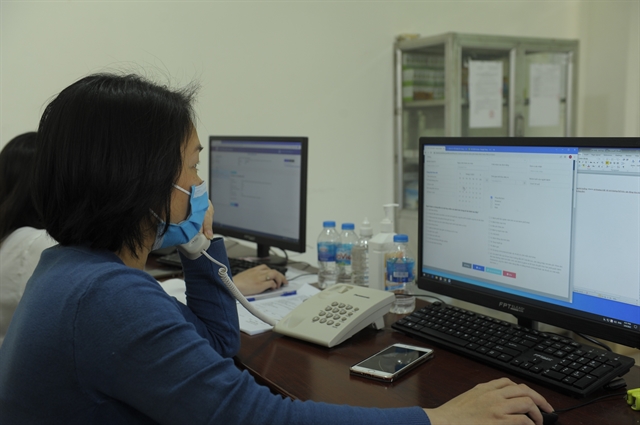 Society
Society

A number of districts in Hà Nội have been successful in using IT applications in monitoring COVID-19 cases

|
| Managing COVID-19 patients through software helps to reduce pressure on grassroots medical staff. — VNA/VNS Photo Mạnh Khánh |
HÀ NỘI — Some districts in Hà Nội have been pushing IT applications in managing coronavirus patients, helping simplify procedures for testing, medical treatment and granting certificates of quarantine termination or recovery.
Over the last few months, the rapid increase of COVID-19 has put tremendous pressure on grassroots medical stations, creating severe backlogs in many localities.
With each positive case, the grassroots government has to issue various decisions and administrative procedures, which is very time-consuming.
The risk of cross-infection is high in grassroots clinics where many people have to stand in line waiting for quick tests to get confirmation of recovery.
But when applying IT, the procedures are processed on the computer instead of manually as before.
In Thạch Bàn Ward of Long Biên District, a COVID patient can call the hotline of their residential area ahead and then be instructed to access the Zalo application on a mobile phone to get a QR code on software to declare their health condition.
The ward’s mobile medical station and volunteers will call to give medical consultation from the initial information.
According to Nguyễn Văn Thắng, chairman of Thạch Bàn Ward, the number of COVID cases in the ward is very high because it has 28,000 residents plus more than 10,000 workers working in Sài Đồng Industrial Park.
In recent days, it recorded more than 500 positive cases while the ward medical centre only has six staff.
"We had to mobilise members of the youth union and young people in the ward to support the medical workers, but they were still overloaded, leading to patients (F0s) not being cared for in time for consultation and examination," Thắng said.
To overcome the situation, the People’s Committee of Long Biên District directed the ward to apply software to manage F0 cases at home and initially had positive results.
“Previously, every time there was a positive case, the authority and medical centre had to issue decisions on medical quarantine, quarantine termination, and make a medical record,” Thắng said.
“All were being done manually, and then the papers had to be delivered by a head of a residential area.”
All the stages were confusing because of the lack of staff and information due to the large area of the ward. But when applying technology, the above shortcomings had been overcome, he said.
"Specifically, after getting the information declared on software, the authorised person only needs to press a 'confirm' option on a computer and the decisions were made and transferred quickly," he explained.
“Due to having the patient code, if a patient wanted to have a hard-copy quarantine decision, the ward only needed to print that decision, and the other cases were kept in the software that helped save time and money,” he added.
Technology application has also helped record daily data reports, medical records, hospital transfer information and discharge.
Since last December, more than 8,000 F0 cases in Thạch Bàn Ward have been monitored and managed by software.
To ease overload for medical staff and save time, Nhật Tân Ward of Tây Hồ District has implemented COVID-19 patient management via the Google Form app.
This ward’s steering committee for COVID-19 pandemic Prevention and Control has instructed residential groups management boards of apartments to use the app.
Đặng Hữu Tiến, the ward’s chairman, said the IT application had made statistics and management of F0 cases in the area more accurate and convenient.
Similarly, Lê Hoàng Đức, chairman of Thanh Nhàn Ward of Hai Bà Trưng District, said that through IT application, his medical centre would send instructions to positive cases for treatment at home to make self-testing, take medicine and make video calls via Zalo to medical staff.
To overcome the overload at grassroots medical establishments, the Hà Nội People’s Committee has just issued a document directing the Department of Health to strengthen IT application training and guidance in monitoring, management, care, and treatment for F0 cases at home.
The municipal committee asked the Information and Communication Department to push information connection to support people about the process and methods of health self-monitoring at home and policies and solutions of the central government and the city to the pandemic prevention and control activities.
Information technology has helped localities better manage positive cases and help reduce administrative procedures for COVID-19 patients.
However, there are shortcomings that need solving.
According to Thạch Bàn Ward’s chairman, it needs unified software for all localities in the city, and a digital signature to be applied for quickly issuing decisions.
It is also necessary to consider the conditions to connect and share information with the national database on vaccinations and social insurance to help reduce time in updating for grassroots medical staff and getting certificates for F0. — VNS




